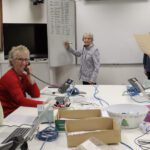C243/08
3 September 2008
WA researchers have embarked on a groundbreaking study to accurately calculate the number of people with severe vision loss in Western Australia, in a world first effort to objectively assess the burden of blindness in the community.
Curtin University of Technology researchers from the School of Public Health and the Lions Eye Institute are being funded by the Eye Surgery Foundation to carry out a study on the Epidemiology of Blinding Eye Disease. They are working with Western Australian ophthalmologists and the Association for the Blind of Western Australia to improve services for the vision impaired.
As an important part of this process they are asking people all over Western Australia with very poor eye sight to have their level of vision loss measured by their local doctor or an optometrist.
“We are all focusing on counting as many of these people as possible in just one week – World Sight Week 6-12 October 2008,” ophthalmologist, Dr Nigel Morlet said.
“It is vital to the outcome of the study that as many blind and severely vision impaired people have their vision level recorded in this one week. It does not matter whether you go to your ophthalmologist regularly or have not seen a doctor in years, please have your vision tested in World Sight Week.”
As these people may not be able to easily travel to their doctor’s surgery because of their poor eyesight, the local Lions clubs are offering to transport blind and vision impaired people during World Sight Week.
“It is important we know how many people there are in WA with poor vision so we will be able to supply them with better services and assistance. We believe that there may be a lot of blind people in rural WA who are particularly underserviced.” said Associate Professor Bill Morgan of the Lions Eye Institute.
Vision loss is a crippling disability that not only results in poor health, but loss of employment, financial hardship and social isolation.
There are many conditions which can result in a person ending up with severe vision loss. One of the commonest causes is age related macular degeneration which affects both men and women in later years. Diabetic retinopathy and glaucoma are also associated with aging. Young people may inherit an early onset blindness condition or suffer a traumatic eye injury.
The best way to look after your sight is to keep fit, eat lots of fruit, greens and fish and less trans-fat in fried foods. Protect your eyes from the sun and injury while working and playing sport. And most importantly give up smoking.
If you think you might have a problem with your vision seek medical help.
Modified: 3 September 2008


